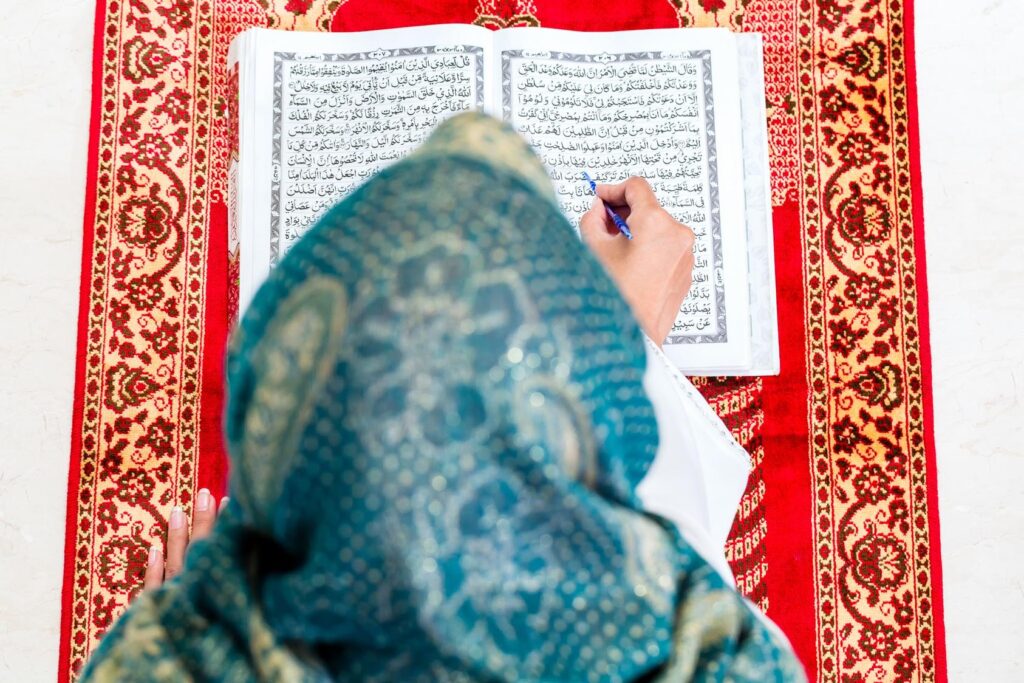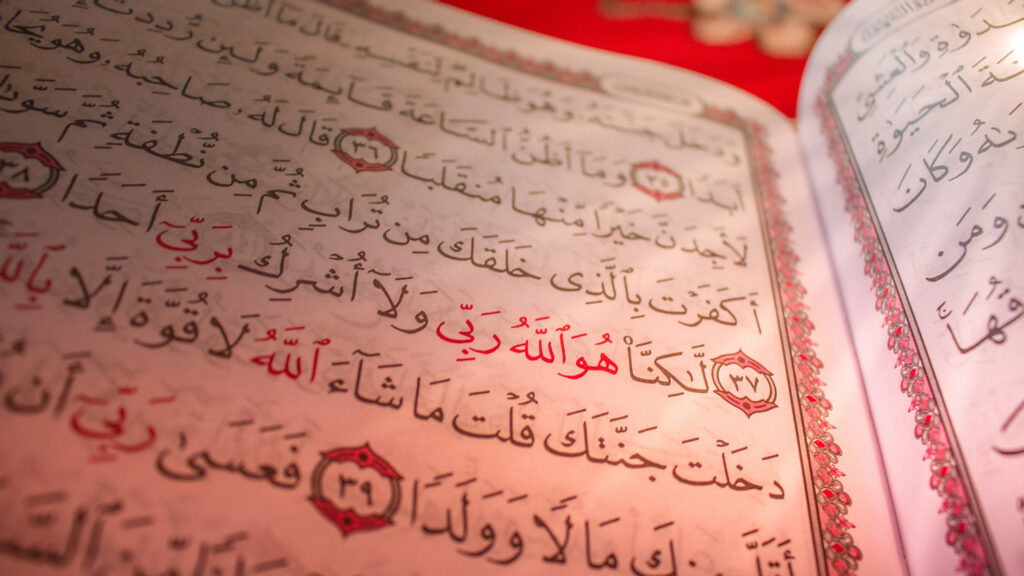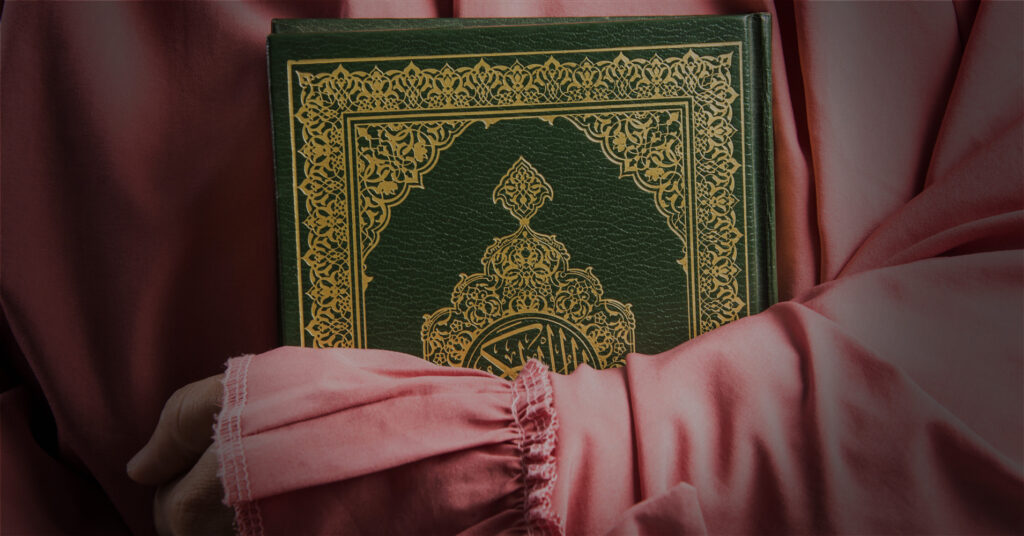The Muslim Women Using Feminine Pronouns for Allah
The pronoun switch is helping women forge deeper religious connections

(Image source: usip.org)
“Is Allah a man?”
It’s a question that Lamya H (a pseudonym), author of the new memoir, Hijab Butch Blues, asked her Qur’an teacher as a six-year-old child. “In my mind, Allah is a woman, floating and ethereal in the night sky,” she writes.
“Allah is not a man or a woman,” her teacher replied, giving a traditional Islamic response to such a question, before changing the subject.
Years later, at age 23 in New York, Lamya was at an event for Muslims where a woman spoke about using “she/her” pronouns for God, jarring and angering others who called it disrespectful, even blasphemous.
“All the Islamic feminists have been writing about it,” the woman explained. “It’s a really important way to fight the patriarchy.”
There is indeed a quiet revolution underway within the literary folds of Islamic feminism, wherein Muslim authors, academics, and activists are using female pronouns for Allah in an attempt to separate God from the idea of a “Divine patriarch.”
Many have been inspired by Muslim theologian amina wadud (who spells her name with lowercase letters). Her book, Qur’an and Woman: Rereading the Sacred Text from a Woman’s Perspective, has been foundational to discussions on women’s rights and roles from progressive Muslim perspectives. wadud’s work has also introduced many to the vitality of Islamic feminism.
When I first spoke with wadud over Zoom, she told me she started diversifying Allah’s pronouns after teaching an undergraduate religious studies course at Virginia Commonwealth University in the late 1990s. wadud asked her students to explore the lyrics of Joan Osborne’s song, “What if God Was One of Us.” While discussing pronouns for God, the men in the class told her that they could relate to God when God was referred to as “He,” but not when God was referred to as “She.” In that moment, wadud decided to start using female pronouns for Allah, who, according to traditional Muslim teachings, transcends gender, yet has historically been described with male pronouns.
“It was not common then, and it is still fraught with lots of controversy now,” wadud tells me of the practice of calling God “She.” “People still get into a tizzy, and I think that’s worth exploring – why is there such a tizzy?”
Getting to the Bottom of Arabic Grammar
According to Islamic teachings, the Qur’an was revealed in Arabic and throughout most of the text, the masculine pronoun, Huwa, is used for Allah. Yet, the text also makes clear that Allah is neither male nor female.
“We are obsessed with the masculine pronoun as if it is a literal articulation of Allah, whom we also will say is beyond gender,” exclaims wadud.
wadud currently lives in Yogyakarta, Indonesia, and tells me about the local language, Bahasa, which has only one pronoun. “Indonesians, on a regular basis will say things like ‘my husband, she’, or ‘my daughter, he’ because their minds are not used to choosing between these different pronouns in English, so they randomly choose one from their files,” she explains. Languages such as Bengali, Turkish, and Persian are similar.
The masculine pronoun has prevailed for so long in reference to Allah because it presents a literal translation of the Arabic language – the language of the Qur’an. However, wadud points out that there are some cases in the text when Allah uses “we,” a pronoun that typically denotes multiplicity and grammatically seems to clash with the concept of monotheism. Yet, Muslims rarely acknowledge the plural nature of “we” and instead choose to center the singular, masculine pronoun for Allah instead.
In his book Muhammad’s Body, Assistant Professor of Religion and Cultural Studies at the University of Central Florida, Michael Muhammad Knight writes that modern Muslim discourses “often dismiss God’s masculine pronoun as a mere accident of Arab grammar, which lacks a gender-neutral pronoun and thereby requires the inscription of ‘he’ or ‘she’ on every noun.” He also notes that within developing, gender-progressive Muslim theologies, God’s “transcendence” of gender is a “prerequisite” for true monotheism. That’s because Allah’s tawhid, or one-ness, requires God to be beyond gender – and that any binary view of gender, or perceived preference for one over the other, would negate this concept of unity, which wadud calls “the tawhidic paradigm.”

(Page in the Quran. Image source: yaqeeninstitute.org)
Ayesha Chaudhry, Professor of Islamic Studies and Gender Studies at the University of British Columbia, explains that all pronouns we use for God ultimately “misgender” God.
“Our language forces God to be constantly misgendered in order to be spoken about,” Chaudhry explains. She released her memoir, The Colour of God, in 2021, and in it, uses both masculine and feminine pronouns for Allah. “I use what feels right to me in context of my writing, and don’t restrict myself to one or the other,” she says. “If what we’re doing by gendering God is always misgendering God, then why misgender only one [way]?”
Author Camille Helminski, who is currently working on an English translation of the Qur’an, also avoids attributing only one gender to God. Helminski is a follower of Sufiism, the Islamic mystical tradition, and her book, The Way of Mary: Maryam, Beloved of God, is a comprehensive account of Jesus’s mother that draws on Christian and Islamic sources. When she translates verses of the Qur’an, she refers to God as “He/She,” embracing a gender-inclusive outlook that is often more common in Sufi discourse than it is in orthodox interpretations of faith.
Balancing the Scale within the Framework of Islamic Theology
There have been centuries of debate within Sufism regarding God’s characteristics. Sufis often describe God through metaphors since, according to their teachings, our Earthly words cannot begin to reflect the sheer magnificence of the Divine. “Human language is basically a reflection of our imagination. And it can’t encompass God. So we’re doing our best,” explains Chaudhry.
Sofia Rehman, Islamic scholar, academic, and author of A Treasury of ‘A’ishah: A Guidance from the Beloved of the Beloved, agrees, deeming language – and any pronoun – to be “inept” and “inadequate” in capturing the totality of the Creator. “Allah is not imprisoned by the binary. Allah is a Oneness that none of us can experience,” she says.
Rehman first came across the possibility of using feminine pronouns for God in the 1990s when she was 12 and reading a coffee-table book authored by pop star Michael Jackson, who referred to God as “He/She.” Now, she leads a virtual book club that discusses inclusive and feminist Muslim texts. She says that she personally veers away from “He” and “She,” and uses “Allah,” “God,” and sometimes “They,” when a pronoun is necessary. “It’s the most gender-neutral pronoun that I could use in English – it’s a comfortable medium,” she explains.
Almost three decades after wadud first began proposing alternative pronouns for Allah, both Rehman and Chaudhry keep her practice alive. While teaching, both switch between pronouns – “He”, “She”, “They” and “It” – when discussing God, so students can critically analyze their allegiances to certain pronouns. “The classroom is such a beautiful place, kind of like a laboratory,” says Chaudhry, who has noticed squirming and physical discomfort around this topic, yet believes it’s an important learning moment, because analyzing this discomfort will reveal our beliefs and biases about gender.
In Islamic theology, a central approach to understanding God is through Allah’s 99 names – such as “The loving,” “The merciful,” and “The guide.” These names are categorised as either jamali (feminine) or jalali (masculine) attributes.
“Allah has both jamali and jalali attributes, meaning that Allah’s nature is inclusive, and not exclusive,” explains wadud. She adds that out of all these divine characteristics, two of the most frequent are Ar Rahman (the beneficent) and Ar Rahim (the merciful). These are jamali (feminine) descriptors, coming from the root word meaning “womb.”
“The Divine feminine nature is frequent and abundant – and yet when it comes to looking at how to refer to Allah, this fixation on the ‘He’ has proven that it is more than grammar, more than a literal reading; it’s also political,” says wadud.
Masculine Pronouns Manifest Patriarchy
Emphasizing God’s masculine attributes at the expense of God’s feminine qualities can have political implications. For instance, if Allah is deemed to be a supreme patriarch, being male can be seen as a prerequisite for religious authority. “When the religion is presented to you so patriarchally, at some subconscious level, Allah is being perceived as male, and that’s very problematic for so many reasons, not least because we also end up having religious leaders who are also always male,” points out Rehman. This has the reverse impression too – “if all authority in the human realm is male then all authority in the Divine realm will also be male,” she explains.
Because language is imbued with power, patriarchal authority manifests with zealousness in communities across the globe – from the oppressive regime of the Taliban in Afghanistan, to instances closer to home, where mosques often have all-male leadership and superior prayer spaces for men, instead of being inclusive houses of worship for Muslim women.
Last year, Assistant Professor of Religion and Politics at Washington University in St. Louis Tazeen M. Ali published The Women’s Mosque of America: Authority and Community in US Islam, which examines how some American Muslim women have created their own worship spaces. Ali tells me that using female pronouns can serve as a “powerful corrective” to help “reclaim one’s faith.” She believes that those who use female pronouns for Allah do so in the pursuit of gender inclusivity in their theological understandings of God.

(Woman holding a Quran. Image source: yaqeeninstitute.org)
Female pronouns can center Allah’s loving, nurturing, and maternal qualities. Giving both pronouns equal weight can offer a more balanced idea of God’s jamali and jalali attributes, and also affirm the gender equality and justice that many Muslims believe is fundamental to their faith.
Yet, according to Rehman, the widespread skepticism associated with using feminine pronouns for God suggests an attitude of “gender contamination” – that associating Allah with the feminine is “an act of pollution.” Why are we uncomfortable with ‘She’ and not ‘He’? What is ‘She’ endowed with that ‘He’ is not endowed with?” she asks.
“For us to pretend that ‘He’ is neutral, and ‘She’ is necessarily tainted by gender – that’s a problem,” says wadud, who emphasizes that language is simply a symbolic means for communication. “It helps us express our understanding of what is beyond language, the prime and the sacred – and when we understand that, then we will not be so fixated on keeping the masculine translation.”
The Challenging Ordeal of Unlearning Language
While it’s mostly Muslim women who are using feminine pronouns for Allah, this movement is not something all Muslim women support. In fact, some find the pronoun switch to be quite destabilizing.
“Some people feel when they refer to God as ‘She,’ it might be disrespectful,” says Chaudhry, who explains that it can be “frightening” and “threatening” for women to have their assumptions about their Creator challenged. “You have an intimate connection: you’ve been talking to him five times a day, when you’re going to sleep, and when you’re scared, stressed out or happy, and this figure has a shape and form in your mind, as much as you don’t want to admit that. But then suddenly to think of this figure, with a different gender – I can understand that would be unsettling,” she says.
“Some women will resist because they want to stay within the fold as they understand it,” wadud tells me. “They have not examined how what we perceive and experience of Islam is all a part of a construct, and that language is one part of the construct.”
wadud converted to Islam 50 years ago, and over the course of her journey admits that she too has spent time in a comfort zone that is a part of this long-standing establishment. “I realized that if I want to free Allah from the box of patriarchy that’s been wrapped around Her, I have to be more radical about how I challenge some of what I considered to be the ‘generic’ when that generic is a construct of history and cultures,” she says.
Another reason why some Muslims may be resistant to using non-masculine pronouns for God is because of the wider debate about pronouns in relation to gender and queerness – a topic deemed firmly taboo in most orthodox Muslim circles.
“I think we’re occupying a political moment when there are so many anxieties around gender identity. There is this real reluctance to move beyond a rigid, binary understanding of gender, and as conversations about gender pronouns become more commonplace, there is pushback to these new practices,” explains Ali.
Ali believes that backlash to female pronouns for Allah is similar to the backlash associated with any developments pertaining to Muslim women – whether it’s the launch of a new inclusive mosque, such as The Women’s Mosque of America in Los Angeles, which is the case study of her book, or the occurrence of a woman-led prayer service, such as the one organised by Muslims for Progressive Values (MVP) for Eid in 2013, still heavily criticised on Twitter a decade later.
wadud is no stranger to this sort of controversy, having delivered a Friday khutbah, or sermon (a role traditionally only performed by Muslim men) in Cape Town in 1994, before leading a mixed-gender prayer gathering in New York in 2005, which stirred up heated debate within Muslim communities across the globe.
“We have to maintain our course, the course of Ar Rahman and Ar Rahim, and Al Wadud (the loving) and Al Karim (the bountiful), until it becomes something that everyone is acclimated to,” says wadud. “We need to correct the misunderstanding that somehow referring to Allah only as ‘He’ is gender-neutral, by increasing our use of ‘She,’ until it becomes comfortable. And when it becomes comfortable, more people will use it.”
She acknowledges, however, that progress takes baby steps, just like it does in the wider context of women’s rights across societies, both religious and secular. “Things like this take root slowly,” she says. According to wadud, recognising the patriarchal politicalization of God as masculine – and the repercussions this can have, is the first step. The second is being sensitized with the idea of the divine feminine – the jamali attributes of Allah, which are just as key to the Creator’s tawhid, or one-ness, as the jalali attributes.
Muslim women are increasingly asserting their religious authority, as can be attested by the publication of The Women’s Khutbah Book: Contemporary Sermons on Spirituality and Justice from Around the World edited by South African Muslim professors Sa’diyya Shaikh and Fatima Seedat, which highlights trailblazing female Muslims reclaiming their voices in religious spaces. Part and parcel of this movement is a linguistic upheaval of the pronouns that have traditionally been associated with Allah. Adamant that Islam values men and women equally, and that the Creator’s feminine attributes are just as integral as their masculine attributes, there is a growing number of Muslim women who will no longer tolerate their faith being cloaked in the garb – or language – of patriarchy.
“Language is powerful,” says Rehman. “I think the pronouns referring to God need to be disruptive, but claiming God’s female attributes will not be the end of the fight; it will just be the beginning.”
Yet, at the end of the day, Rehman says she will prioritize the content of her message over pronouns. “If I know that using ‘She’ means that people are going to shut their ears off to me, to hearing all the other stuff that I think is more important and that actually builds the foundation on which people will become more comfortable with using different pronouns, then I’m not going to use it just for the shock factor,” she explains.
Rehman adds that the Prophet Muhammad spoke to people at the level at which they would understand, “in the mode which would be most openly received by their hearts.” She believes that using this wisdom discretionarily is crucial when it comes to Allah’s pronouns.
Hafsa Lodi is an American-Pakistani writer with a B.A. in Journalism and M.A. in Islamic Law. Her debut non-fiction book, Modesty: A Fashion Paradox (Neem Tree Press: 2020), explores the global rise of the modest fashion movement from cultural, religious, political and feminist lenses.